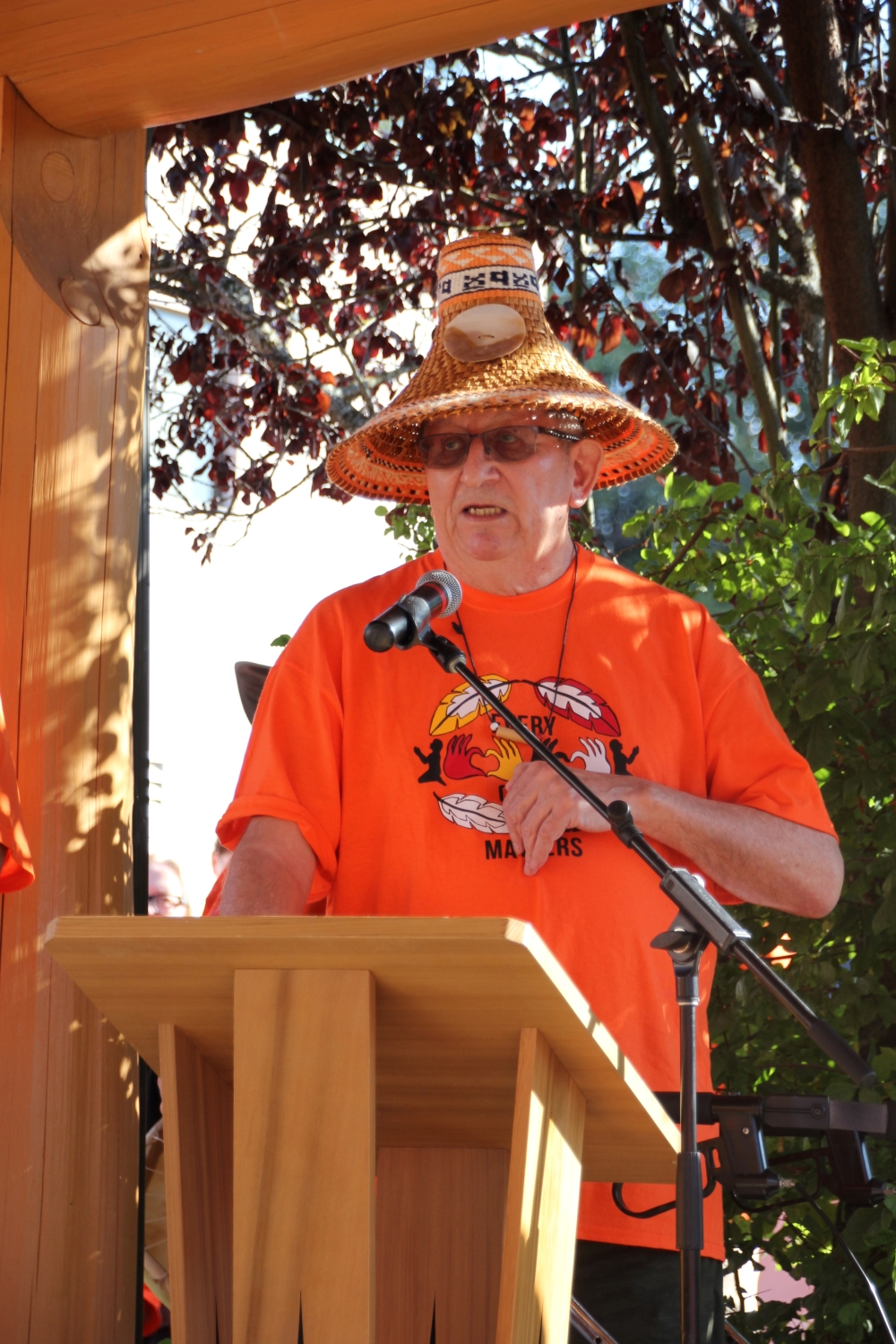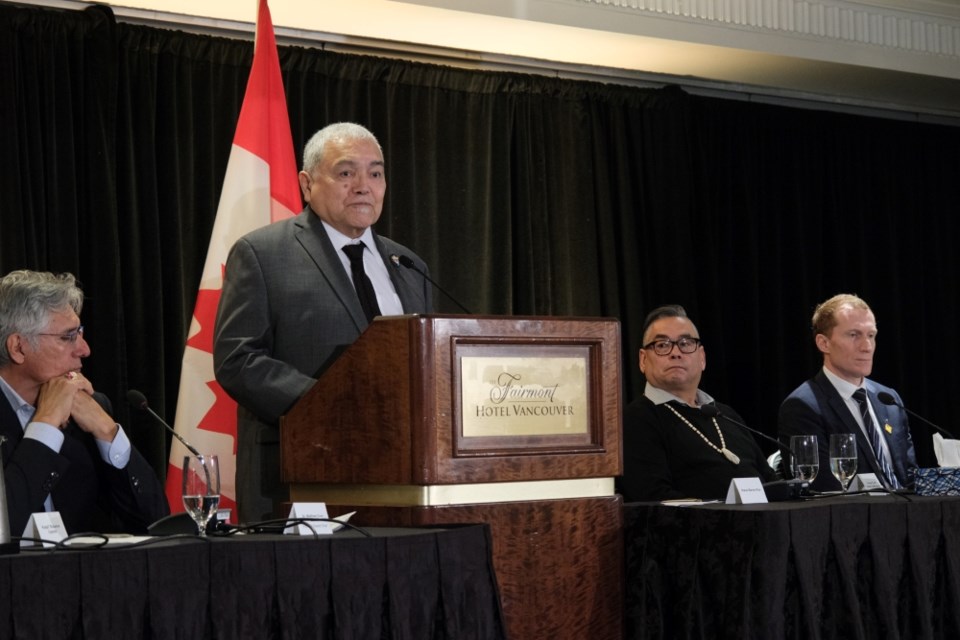Help and support for survivors and their families can be found through the Hope for Wellness Help Line at 1-855-242-3310 or hopeforwellness.ca. A crisis line is also available through Indian Residential School Survivors and Family at 1-866-925-4419.
For the first time in its history, the Government of Canada has agreed to compensate a community rather than an individual for the harms done to it — and the proposed agreement announced on Jan. 21 includes 325 Indigenous nations.
The lawsuit brought forward by Tk’emlúps te Secwepemc First Nation and shíshálh First Nation more than a decade ago has finally come to an agreement: the federal government will create a $2.8 billion trust dedicated to support reviving language, culture, and heritage and promoting wellness for 325 First Nations bands affected by residential schools.
On Jan. 21, former shíshálh Nation hiwus (Chief) Garry Feschuk, former Tk’emlúps te Secwepemc chief Shane Gottfriedson, and Crown-Indigenous Affair Minister Marc Miller, announced the deal has been signed.
"It has taken Canada far too long to own up to its history, own up to the genocide it committed and recognize the collective harm caused to our Nations by Residential Schools,” Feschuk, whose ancestral name is ?akista xaxanak, said in a press release. “It is time that Canada not only recognize this harm but help undo it by walking with us. This settlement is a good first step."
The settlement will apply to the 325 nations that opted into the Gottfriedson Band Reparations Class Action. ?akista xaxanak and Gottfriedson launched the suit with the support of the Grand Council of the Crees (Eeyou Istchee) on behalf of day scholars who were not eligible for the 2006 settlement granted to survivors who attended residential school full-time.
"Our Nations started this lawsuit because we saw the devastating impacts that residential schools had on our Nations as a whole,” Gottfriedson said in a press release. “The residential school system decimated our languages, profoundly damaged our cultures, and left a legacy of social harms. The effects go beyond my generation. It will take many generations for us to heal. This settlement is about taking steps towards undoing the damage that was done to our Nations."

A long fight
In an interview, ?akista xaxanak recalled getting the call from Shane Gottfriedson on Boxing Day many years ago, asking if their two nations could join forces to sue the Government of Canada.
On Jan. 18, ?akista xaxanak signed the long-awaited agreement in shíshálh Nation council chambers with hiwus Warren Paull, then attended the public announcement via Zoom. The fight for survivors has taken a toll on his health over the years, but ?akista xaxanak had made promises to see it through to the end. Although he resigned from his role as elected chief after a stroke, succeeding shíshálh Nation councils asked him to stay on the class action lawsuit. Once the Day School class action was certified, he travelled to almost every community in B.C. and to nearly every province, to make sure the notice got out.
“It’s been a long struggle. That file took my health, but it didn’t take my fight,” ?akista xaxanak said.
“A huge layer of genocide was lifted on Saturday when that press conference happened,” he said.
“There was such an overwhelming feeling because the hard battle that we fought is coming to fruition now. To make sure that this never happens to our children again.”
The concept of Indian Residential Schools in Canada was “to kill the Indian in the child,” by forbidding Indigenous languages and stripping children of their identity — an act of cultural genocide that was enforced by severe punishments and abuse, ?akista xaxanak said.
Across Canada, there were 139 residential schools funded by the federal government from the 1800s until the last closed in 1996. According to federal documents, a day school and residential school operated on shíshálh Nation lands between 1904 and 1975. Children and youth from 51 First Nations attended St. Augustine's Indian Residential School in Sechelt.
“To me, that's the biggest thing of all in that settlement is that we finally got Canada to agree and stop their denial and stop fighting us like this never happened, as we know it did,” he said, adding that the report from the ground penetrating radar in Sechelt will be coming out soon. Steps will be taken to protect the survivors when the “hidden truths” come to the surface.
In a press release, hiwus Paull, "As a result of residential schools, within a few generations, sháshíshálhem went from being the first language of nearly everyone in our Nation to being on the verge of disappearing forever. We lost our last fluent speakers over the past few years. Much of this harm cannot be undone. With today's announcement, First Nations will be able to continue restoring and revitalizing some of what was lost."
Language, culture, heritage and wellness
The representative plaintiffs developed four pillars to guide the settlement: the revival and protection of Indigenous languages, the revival and protection of Indigenous cultures, the protection and promotion of heritage, and wellness for Indigenous communities and their members.
An initial $200,000 for each band class member will support the development of 10-year strategic plan that reflects the four pillars. Once the proposals are reviewed, the Initial Kick-Start Funds of $325 million will begin disbursement. An annual investment income will be received by each band class member for the following 20 years.
“I’m so happy that 325 nations across Canada have joined us, and so everyone’s going to benefit from it,” ?akista xaxanak said.
A project ?akista xaxanak is looking forward to is the syiyaya Reconciliation Movement’s Regalia Project that will create ceremonial regalia to replace what was stolen and destroyed. ?akista xaxanak said they hope to have a ceremony to honour the survivors with the regalia this summer. He also wants to honour the survivors who passed on with their trauma still intact. “They never ever got to see this day, and there are still a lot of our survivors here suffering in silence in our community,” he said.
?akista xaxanak said the most important part is the dialogue with communities without government interference. The trauma that has been handed down from generation to generation will be addressed as nations “take the first steps to see how we can become a vibrant community again.”
A $2.8-billion trust
The not-for-profit trust will be independent of the federal government and will have a permanent board of nine Indigenous directors who will be elected. Tk’emlúps te Secwépemc, shíshálh Nation, and the Grand Council of the Crees will each approve three of the directors. Five of the directors will be appointed to represent their region: B.C./Yukon, Alberta/NWT, Saskatchewan, Manitoba, Quebec/Ontario/the Atlantic provinces.
This decision follows a settlement for the Gottfriedson Day Scholars in 2021, which provided individual compensation to Day Scholars and their descendants and created the Day Scholars Revitalization Society. Day Scholars include the people who attended residential schools but were permitted to return home in the evenings. The 2021 settlement saw the separation of the band class so that the survivors and descendant classes could receive compensation in their lifetime. Now, an agreement has been reached for all three classes.
The lawsuit for the band class reparations was scheduled for trial in September, ?akista xaxanak said, but the day before the federal government came to the table with an offer. Although ?akista xaxanak was looking forward to the trial, he said he'd rather have the settlement. “With all the unmarked graves being found all across Canada, I don’t believe we need any more evidence,” he added.
More terms of the band class settlement are expected to be released in the next month. Between Feb. 27 and March 1, a settlement approval will take place before a federal court. The funds will be transferred to a trust after an appeal period.
Canada will also give another apology, ?akista xaxanak said.
"We believe that all Survivors deserve justice and the compensation to which they are owed. As we finalize this settlement, we are reminded of the importance of collaborative dialogue and partnership in resolving historic grievances outside of the court system. Together, we have developed a settlement that will support the Band class members in their healing journeys for generations to come," Minister Marc Miller said in a press release.
“My dream is that none of this trauma, the cycles of trauma, is ever handed down to another generation. That's my dream, that we can now take the steps necessary to start healing our people. And everything that they're suffering from was not their fault,” ?akista xaxanak said.



